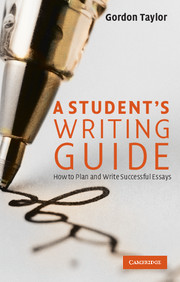Preface
Published online by Cambridge University Press: 28 January 2010
Summary
When the first edition of this book was published I believed that it could and should have a fairly limited life. This belief was founded on the idea that, such is the closeness of language, thought and subject matter, the future of such books would be based on the disciplines of knowledge in the humanities and social sciences and that, consequently the best people to write such a text were those who knew the rhetoric of their own disciplines more intimately than a generalist ever could. The teaching of a discipline, I have long held, should include as an inalienable component the teaching of how to write in that discipline, just as the Roman scholar-statesman Cicero had inveighed in his De Oratore against ‘that absurd, needless and deplorable conception, that one set of persons should teach us to think, and another teach us to speak’.
To some extent this has come to pass – but only to some extent. There are now student manuals on how to write in some disciplines, particularly history, English literature, psychology, philosophy and sociology. What I did not foresee is the extent to which many of the old disciplinary boundaries have begun to blur, and the extent to which new inter-disciplinary ‘studies’ subjects have come to characterise the offerings of arts and social science faculties. Much in the climate of thought (and rhetoric) has changed. As a result, there still seems to be a good case for a general book such as this one, in which I have taken the opportunity to engage with these new developments. Moreover, many other things have moved on.
- Type
- Chapter
- Information
- A Student's Writing GuideHow to Plan and Write Successful Essays, pp. xi - xivPublisher: Cambridge University PressPrint publication year: 2009

